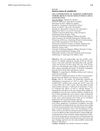 3 citations,
June 2004 in “Annales De Dermatologie Et De Venereologie”
3 citations,
June 2004 in “Annales De Dermatologie Et De Venereologie” Four new cases of gynecomastia (male breast enlargement) linked to finasteride (Propecia) have been found.
 June 2007 in “Endocrinology and Metabolism Clinics of North America”
June 2007 in “Endocrinology and Metabolism Clinics of North America” The document covers various male health issues, their causes, treatments, and related conditions.
 228 citations,
February 2003 in “Urology”
228 citations,
February 2003 in “Urology” Androgen deprivation therapy for prostate cancer can cause sexual, physical, and psychological side effects, and doctors should manage these carefully.
 81 citations,
June 2014 in “American Journal of Men's Health”
81 citations,
June 2014 in “American Journal of Men's Health” Finasteride can cause lasting sexual, emotional, and cognitive issues, with varying severity.
5 citations,
November 2015 in “Journal of Mind and Medical Sciences” Finasteride can cause serious physical, mental, and sexual side effects, even after stopping the treatment.
2 citations,
July 2017 in “Oman medical journal” A man with a rare adrenal cancer showed unusual symptoms and died four months after diagnosis.
 February 2012 in “Community oncology”
February 2012 in “Community oncology” The document concludes that accurately identifying leukemia types is crucial, and the risks of cancer from finasteride need careful evaluation against its benefits.
67 citations,
April 1988 in “The Journal of Clinical Endocrinology & Metabolism” A subtle androgen receptor abnormality can allow normal male development and sometimes fertility despite partial androgen resistance.
 30 citations,
March 2001 in “Archives of Dermatology”
30 citations,
March 2001 in “Archives of Dermatology” Finasteride can cause one-sided breast enlargement, which disappears after stopping the drug.
 May 2017 in “Urology and andrology”
May 2017 in “Urology and andrology” Finasteride and dutasteride, used for prostate issues and hair loss, can cause side effects like sexual dysfunction and mental issues, which may continue even after stopping the medication, a condition called post-finasteride syndrome, for which there's currently no cure.
 February 2012 in “Community oncology”
February 2012 in “Community oncology” Finasteride for hair loss may increase the risk of certain cancers and has side effects; better regulation and education on its use are needed.
 July 2023 in “The journal of sexual medicine”
July 2023 in “The journal of sexual medicine” Anabolic-androgenic steroids harm male hormone levels, sperm, metabolism, and can cause acne, hair loss, and breast growth.
 April 2007 in “9th European Congress of Endocrinology”
April 2007 in “9th European Congress of Endocrinology” Finasteride, a hair loss medication, was found to be safe and effective in improving hair quality and stopping hair loss in men with early-onset baldness.
19 citations,
June 2021 in “The world journal of men's health” Using anabolic-androgenic steroids can harm men's reproductive health and increase the risk of heart problems and death.
 April 2024 in “JCEM case reports”
April 2024 in “JCEM case reports” A man's breast enlargement from low-dose finasteride for hair loss didn't go away, even with treatment, and might be more common than reported.
14 citations,
April 1978 in “International Journal of Dermatology” Antiandrogens can treat acne, hirsutism, and seborrhea by reducing sebum production and androgen action.
 90 citations,
May 2019 in “Drugs”
90 citations,
May 2019 in “Drugs” Long-term use of azole antifungals can cause hair loss, hormonal imbalances, and severe skin reactions.
 13 citations,
November 2012 in “PubMed”
13 citations,
November 2012 in “PubMed” 5α-reductase inhibitors may worsen sexual drive and spontaneous erections but don't worsen existing erectile or ejaculatory problems.
 January 2022 in “Skin appendage disorders”
January 2022 in “Skin appendage disorders” Finasteride is effective for male hair loss, but it may cause fertility issues, mental health problems, and rarely, breast growth. Regular health checks can reduce the risk of prostate cancer. Patient understanding and involvement in treatment is important.
 December 2024 in “Australasian Journal of Dermatology”
December 2024 in “Australasian Journal of Dermatology” Topical finasteride can cause breast enlargement and tenderness in men.
 August 2023 in “Medicina-lithuania”
August 2023 in “Medicina-lithuania” Abusing steroids can damage your heart, muscles, reproductive system, liver, skin, and brain, and may increase the risk of Alzheimer's disease.
March 2020 in “European Journal of Pediatric Dermatology” Isotretinoin can cause gynecomastia by lowering testosterone levels.
 1 citations,
November 2016 in “Journal of the Dermatology Nurses’ Association”
1 citations,
November 2016 in “Journal of the Dermatology Nurses’ Association” Finasteride treats hair loss but may cause side effects like low libido and dizziness.
 19 citations,
October 2018 in “PLOS ONE”
19 citations,
October 2018 in “PLOS ONE” 5 alpha-reductase inhibitors can slightly improve symptoms of enlarged prostate but have a high risk of sexual side effects.
 1 citations,
April 2019 in “Clinical Breast Cancer”
1 citations,
April 2019 in “Clinical Breast Cancer” Medicines for enlarged prostate may raise the risk of breast growth and tenderness but not breast cancer.
 9 citations,
March 2019 in “European Journal of Sport Science”
9 citations,
March 2019 in “European Journal of Sport Science” New signs like changes in blood markers, physical symptoms, and behavioral shifts may help detect hidden steroid use in athletes.
 8 citations,
January 2009 in “Indian Journal of Dermatology, Venereology and Leprology”
8 citations,
January 2009 in “Indian Journal of Dermatology, Venereology and Leprology” Finasteride can cause rare breast growth side effect, with varying recovery after stopping.
 January 2025 in “HORMONES”
January 2025 in “HORMONES” Gender-affirming hormone treatments need better patient-focused outcome measurements and standardized data collection.
 18 citations,
February 2016 in “The Journal of Clinical Endocrinology and Metabolism”
18 citations,
February 2016 in “The Journal of Clinical Endocrinology and Metabolism” Advancements in male reproductive medicine are ongoing, but more research and improved treatments are needed in several areas.
 49 citations,
December 1997 in “Urology”
49 citations,
December 1997 in “Urology” Tamoxifen effectively treats gynecomastia without causing impotence.
























